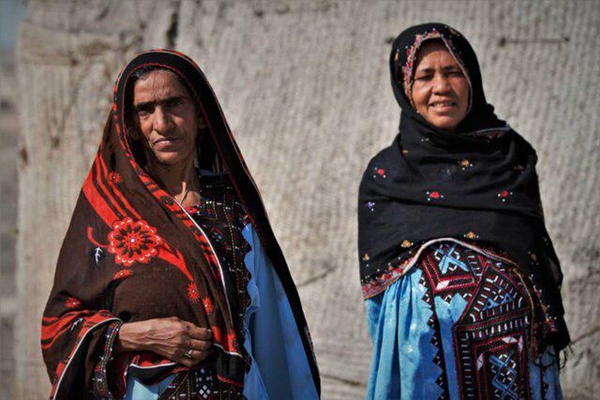Despite various physical and spiritual pains and their lack of access to the basic facilities of daily life, the two women have done their best to promote folklore music of the province by holding concerts in Iran and the rest of the world, not just for women but also for men. They have already held various concerts in a number of countries including Italy, France and Switzerland.
Zobeideh Azadi lives in a village near Nikshahr town. She suffers from kidney stones. She has lost most of her teeth and can’t eat food easily. She is 53, the mother of one boy and three daughters.
It’s been about 20 years that she is working with Mousa Baluch, a local player. She has learned singing by herself. She became familiar with Mousa about 20 years ago when the latter was playing Doneli (a traditional musical instrument similar to flute) during her wedding ceremony. Since then, they have been cooperating with each other. So far, they have held various concerts in a number of countries to promote the local music of Sistan and Baluchestan. Their concerts have been warmly welcomed so far.
Zobeideh cannot speak Persian eloquently. She says women in her province are not allowed to sing even in female-only ceremonies. “Our local culture bans women from singing. This is indeed the males who ban us. But my father, brothers and even husband didn’t ban me. After marriage, I began to sing because my husband didn’t seek to restrict me.”
She recalls some of her performances in other countries and takes their photos with herself to substantiate his words on concerts and give complete responses to anyone asking about her career as a singer.
Sometimes, Zobeideh and Shamshuk – another artist woman from the same region – hold joint projects. Shamshuk cannot travel abroad because she doesn’t have a passport. So, Zobeideh takes her place in foreign tours and sings in concerts held in foreign countries.
Shamshi Behruz known as Shamshuk lives in a remote village near Chabahar. Like Zobeideh, Shamshuk doesn’t know how old she is. Based on her ID card, she is 60 years old. She lives in Bahoukalat village which is widely known for its mugger crocodiles – locally called Gando.
Shamshuk became familiar with Baluch music when she was a kid. She has already held various concerts in Pakistan (a neighbor of Iran’s Sistan and Baluchestan). She knows the ups and downs of Baluch folklore music. She has already begun to teach the music to her daughter Madineh to preserve it.
Mohammad Reza Darvishi, a leading Iranian researcher in folklore music has repeatedly tried to have official music centres to give Shamshuk an honourary degree but to no avail. Some years ago, Shamshuk held a concert during a music festival in Zahedan.
